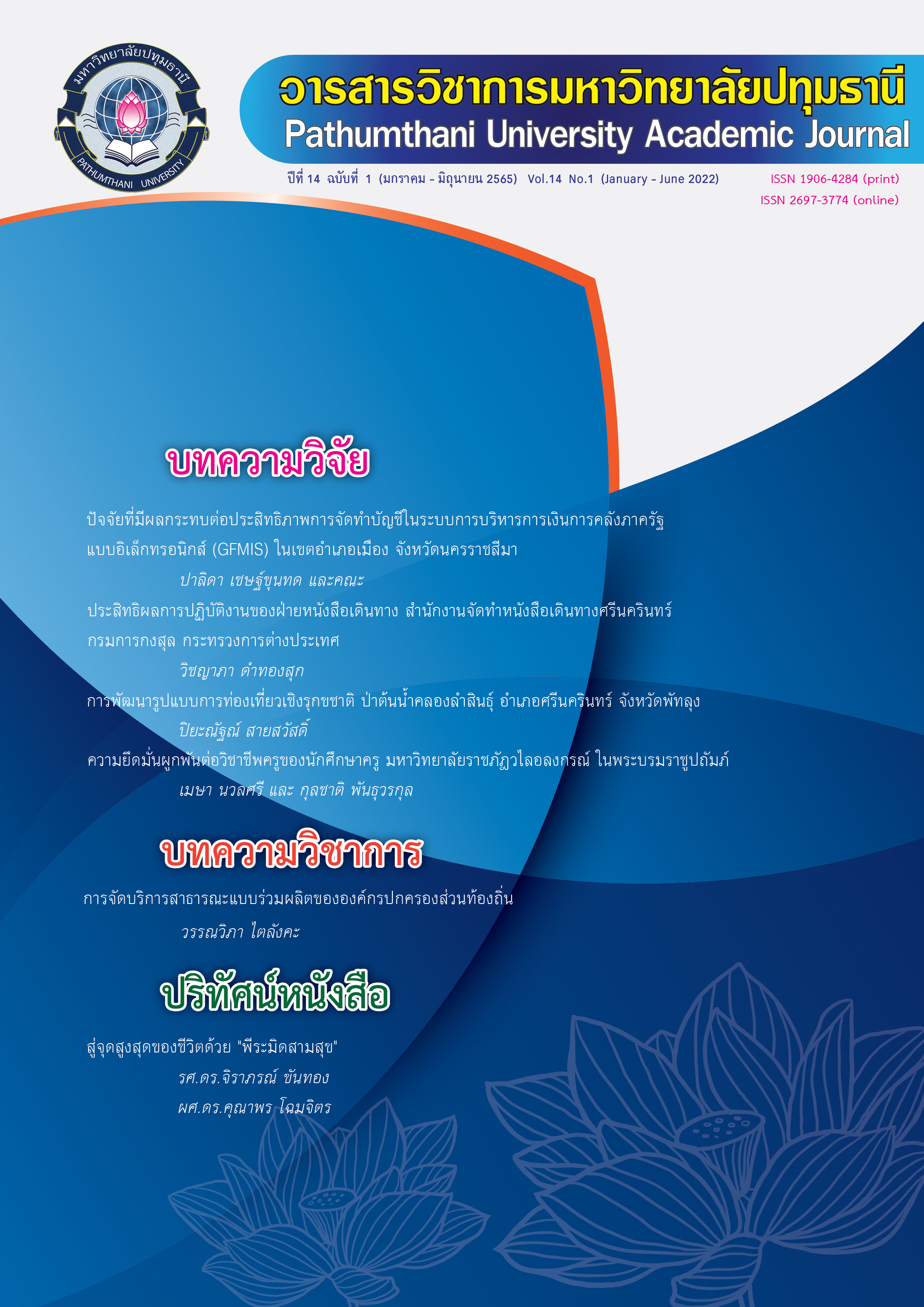EXCELLENCE MANAGEMENT: STRATEGIES TOWARD ‘SCHOOL AS A LEARNING COMMUNITY’ FOR SECONDDARY SCHOOLS
Keywords:
Strategies, Excellence Management , School as a Learning CommunityAbstract
The purpose of the article is to present the concept of school development as a learning community. It can lead to organizational management to excellence at the secondary school level as a result of the research study on the management strategy of excellence in secondary schools to become a learning community of the authors. By starting with 1) School as Learning Community concept in foreign countries and in Thailand 2) School components as learning community and characteristics of school as learning communities. 3) External contexts of secondary school administration. Policy and administration of secondary schools under the Office of the Basic Education Commission. 4) Excellence in Secondary School Management under the Office of Basic Education Commission Quality Award (OBECQA) and 5) Defining strategies for managing excellence of secondary schools to become a community of learning.
Excellence management strategies for secondary schools towards school as a learning community consists of 6 strategies: 1) Transform the development of teachers and educational staffs’ capacity towards the vision and philosophy of school as a learning community, 2) Transform the development of school principals’ paradigm on vision and philosophy of school as a learning community, 3) Transform the relationship and engagement with learners and stakeholders to enhance participation in education reform in schools based on the philosophy of school as a learning community, 4) Develop management, analysis, and knowledge management system following the philosophy and activities of the school as a learning community, 5) Develop teachers’ mindset and performance consistent with the philosophy and activities of school as a learning community, and 6) Continue developing the strategic plans in line with the vision of the school as a learning community.
References
ซาโต มานาบุ. (2559). การปฏิรูปโรงเรียน แนวความคิด “ชุมชนแห่งการเรียนรู้” กับการนำทฤษฎีมาปฏิบัติจริง. นนทบุรี : โรงพิมพ์ภาพพิมพ์.
ณัฏฐพันธ์ เขจรนันทน์. (2552). การจัดการเชิงกลยุทธ์. กรุงเทพมหานคร : ซีเอ็ดยูเคชั่น.
ตรีนุช เทียนทอง. (2564). นโยบายการจัดการศึกษา 7 วาระเร่งด่วนของกระทรวงศึกษาธิการ. [ออนไลน์]. เข้าถึงได้จาก https://moe360.blog/2021/03/29/29-3-2564
พรรณวดี ปามุทา, สุภัทรา เอื้อวงศ์ และ ชญาพิมพ์ อุสาโห. (2561) “ปัจจัยความสำเร็จในการบริหารจัดการโรงเรียนมาตรฐานสากล ระดับประถมศึกษา สังกัดสำนักงานคณะกรรมการการศึกษาขั้นพื้นฐาน”. วารสารศึกษาศาสตร์ มสธ. ปีที่ 11 ฉบับที่ 1. หน้า 146-161.
ยูเนสโก. (2539). การเรียนรู้ขุมทรัพย์ในตน (Learning : The Treasure Within). รายงานเสนอต่อยูเนสโก โดยคณะกรรมาธิการนานาชาติว่าด้วยการศึกษา ในศตวรรษที่ 21. สำนักงานคณะกรรมการการศึกษาแห่งชาติ 2540 ฉบับภาษาไทย.
ราตรี ศรีไพรวรรณ. (2555). การพัฒนากลยุทธ์การบริหารสู่ความเป็นเลิศของโรงเรียนมาตรฐานสากลระดับประถมศึกษา. วิทยานิพนธ์ปริญญาครุศาสตรดุษฎีบัณทิต สาขาวิชาบริหารการศึกษา. จุฬาลงกรณ์มหาวิทยาลัย.
ลัดดา ภู่เกียรติและคณะ (ม.ป.ป). แนวทางการสร้างโรงเรียนแห่งชุมชนการเรียนรู้กรณีศึกษาโรงเรียนสาธิตพัฒนา. [ออนไลน์]. เข้าถึงได้จาก https://www.satitpattana.ac.th/web/news/public_ksp_OneSchoolOneInnovation2560/Guide_to_Creating_School_Community_Learning.pdf
ศนิชา ภาวโน. (2562). รูปแบบการพัฒนาผู้บริหารโรงเรียนตามแนวคิดโรงเรียนเป็นชุมชน แห่งการเรียนรู้. วิทยานิพนธ์ปริญญาครุศาสตรดุษฎีบัณฑิต สาขาวิชาบริหารการศึกษา จุฬาลงกรณ์มหาวิทยาลัย.
ศรัญญา อ่าวสมบัติกุล. (2562). โรงเรียนพุทธจักร : ชุมชนการเรียนรู้นำร่อง เพื่อประสิทธิภาพของผู้เรียนและครู โรงเรียนพุทธจักรวิทยา : ชุมชนการเรียนรู้นำร่อง เพื่อประสิทธิภาพของผู้เรียนและครู. [ออนไลน์]. เข้าถึงได้จาก https://adaybulletin.com/life.com/life-feature-lifelong-learning-buddhajakwittaya-school/42223.
สำนักงานคณะกรรมการการศึกษาขั้นพื้นฐาน. (2557). นโยบายสำนักงานคณะกรรมการการศึกษาขั้นพื้นฐาน ปีงบประมาณ พ.ศ. 2558. กรุงเทพมหานคร : ชุมนุมสหกรณ์ การเกษตรแห่งประเทศไทย.
สำนักงานคณะกรรมการการศึกษาขั้นพื้นฐาน. (2560). คู่มือประกอบการอบรมการขับเคลื่อน กระบวนการ PLC (Professional Learning Community) ชุมชนแห่งการเรียนรู้ทางวิชาชีพสู่สถานศึกษา. กรุงเทพมหานคร : โรงพิมพ์ชุมนุมสหกรณ์การเกษตรแห่งประเทศไทย.
สำนักงานคณะกรรมการการศึกษาขั้นพื้นฐาน. (2561). ยุทธศาสตร์การศึกษาขั้นพื้นฐาน 20 ปี(พ.ศ. 2561-2580). สืบค้นจาก https://www.obec.go.th/wp- content/uploads/2019/06/
สำนักงานคณะกรรมการพัฒนาเศรษฐกิจและสังคมแห่งชาติ. (2562). ยุทธศาสตร์ชาติ พ.ศ. 2561-2580 (ฉบับย่อ). [ออนไลน์]. เข้าถึงได้จาก https://www.nesdc.go.th/download/document/SAC/NS_SumPlanOct2018.pdf
สำนักพัฒนานวัตกรรมการจัดการศึกษา. (2563). การประชุมปฏิบัติการจัดทำแนวทางการยกระดับคุณโรงเรียนเป็นชุมชนแห่งการเรียนรู้ (School as Learning Community). เพื่อพัฒนาสมรรถนะพลเมืองรุ่นใหม่. [ออนไลน์]. เข้าถึงได้จาก http://www.innoobec.com/?p=174333#page-content.
อนงค์กาญจน์ ศรีจันทร์. (2563). แนวทางพัฒนาการบริหารโรงเรียนคุณภาพประจำตำบล ตามแนวคิด โรงเรียนเป็นชุมชนแห่งการเรียนรู้. วิทยานิพนธ์ปริญญาครุศาสตรมหาบัณฑิต สาขาวิชาบริหารการศึกษา. จุฬาลงกรณ์มหาวิทยาลัย.
Caron Elizabeth A. and Mclaughlin A. 2002. “Indicators of Becons of excellence schools : What do they tell us about collaborative practice”. Journal of education & Psychological consultation. Vol. 13 No. 4. pp. 285-304.
Coulter. (2008). Strategic management in Action. (4th ed.). New Jersey: Pearson Education.
Kruse, S. D., & Louis, K. S. (1993). An Emerging Framework for Analyzing School-Based Professional Community. the annual meeting of the American Educational Research Association.
OFSTED. (2012). Provides links to school reports and official publications as well as a FAQ and contact details. [Online]. From:http://www.tame side.gov.uk/school grid/self assess/framework.htm
Shapiro, N. S., & Levine, J. H. (1999). Creating Learning Communities : A Practical Guide to Winning Support, Organizing for Change, and Implementing Programs. Jossey Bass Higher and Adult Education Series: ERIC.
Smith, B., & MacGregor, J. (2009). Learning Communities and the Quest for Quality. Quality Assurance in Education. Vol. 17, 118-139. doi:10.1108/09684880910951354
Downloads
Published
How to Cite
Issue
Section
License
Copyright (c) 2022 จิณณภัทร พิบูลวิทิตธำรง

This work is licensed under a Creative Commons Attribution-NonCommercial-NoDerivatives 4.0 International License.
บทความที่ได้รับการตีพิมพ์เป็นลิขสิทธิ์ของวารสารมหาวิทยาลัยปทุมธานี
ข้อความที่ปรากฎในบทความแต่ละเรื่อง เป็นความคิดเห็นส่วนตัวของผู้เขียน กองบรรณาธิการไม่จำเป็นต้องเห็นด้วยเสมอไป และไม่มีส่วนรับผิดชอบใด ๆ ถือเป็นความรับผิดชอบของผู้เขียนแต่เพียงผู้เดียว



